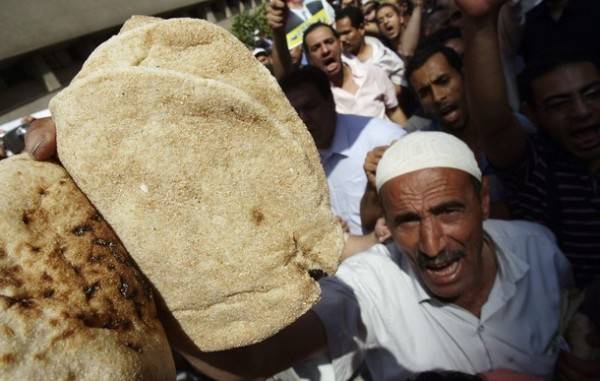
Egypt’s economy has been deteriorating for months, but the latest indicators suggest that the country may be headed for a much more serious downturn. On December 21, Moody’s Investors Service downgraded Egypt’s government bond ratings by one notch to B2 from B1 and has also placed the rating on review for further possible downgrade. This news comes as no surprise given the current political instability as well as the absence of a clear roadmap for the remainder of the transitional period. It is common knowledge that predictability is the key to any investment decisions. The uncertainty of Egypt’s political future and its unpredictable institutional framework are a serious impediment to attracting foreign direct investment and, consequently, to economic growth.
In addition to political repression and recurrent human rights violation, the economic suffering of Egyptians and their frustration with inequality in the distribution of resources and opportunities were a fundamental catalyst of the January revolution that demanded the fall of the regime and ended by ousting Hosni Mubarak.
Eleven months after the revolution, the stagnant economy is still contributing to unrest in the streets, but the economic dimension of the uprisings remains to a large extent absent from the public debate. Although Egypt’s economic problems have been widely acknowledged by successive governments, by political parties and by Egyptians themselves, very little is being said about the economy’s unsteady trajectory during the transition and the prospects for recovery and growth over the long-run. Detailed economic programs are absent from the majority of new and old political parties’ manifestos. Apart from large and appealing headlines proclaiming the need for combating inflation, unemployment and class inequality, none of them presents a pragmatic and detailed program for improving macroeconomic stability and bringing growth, social cohesion and equality to Egyptian society.
The third and final round of elections for the People’s Assembly will take start on January 4, but the preliminary results indicate that the next parliament will be dominated by the Islamist parties led by the Muslim Brotherhood’s Freedom Justice and Freedom Party (JFP). At first sight, one might believe that the economic program proposed by the FJP is generally free market-oriented. The party does support the development of the private sector and engagement with the global economy. Nevertheless, the FJP has not yet presented a concrete program outlining how they intend to put theory into practice. Ambiguities in the FJP’s platform raise a number of questions, particularly in the banking sector, where the party’s intentions remain uncertain. For example, it is not clear what will be the future of non-Islamic banks (an important repository for foreign capital) or if they will be “gradually” phased out in favor of Islamic banks. But again, economic issues, in spite of the anxiety they cause, are pushed into the background. Today’s debates revolve around politics, with the basic theme being dominated by the question of why there has been so little concrete change in Egypt, especially when compared to neighbour Tunisia, where post-authoritarian transition is progressing more smoothly.
Unfortunately, Egypt does not have the luxury of ignoring an economic situation that has already been deteriorating for far too long. According to the Central Bank of Egypt, net international reserves had fallen to $USD 20 billion by the end of November 2011 (equivalent to 5 months of imports), down from $USD 34 billion before the revolution. Inflation is constantly high (9 percent in November), with food inflation rising into the double digits. The reversal of portfolio investments from net inflows of $12.2 billion into net outflows of $8.9 billion in January/September 2011, and the dramatic drop in FDI to US$ 375.5 million (from US$ 5.7 billion) during the same period last year are increasing the pressure on Egypt’s already strained balance of payment.
Tourism activity and revenues have picked up slightly from the severe drop that followed the revolution. But another steep decline in tourism and in foreign reserves alongside a rise in an already high unemployment rate would only make matters worse.
So far, Egypt’s government has been relying on local banks to finance its spending needs. But faced with a significant increase in domestic borrowing costs, the government has recently started to consider alternatives to decrease reliance on domestic funding. As a result, Egypt may resume negotiations over a previously rejected $3 billion IMF loan package. If an agreement can still be reached, external borrowing would help avoiding the crowding-out of the private sector and is likely to lessen the borrowing costs.
Image: 1280138165003542100.jpg

